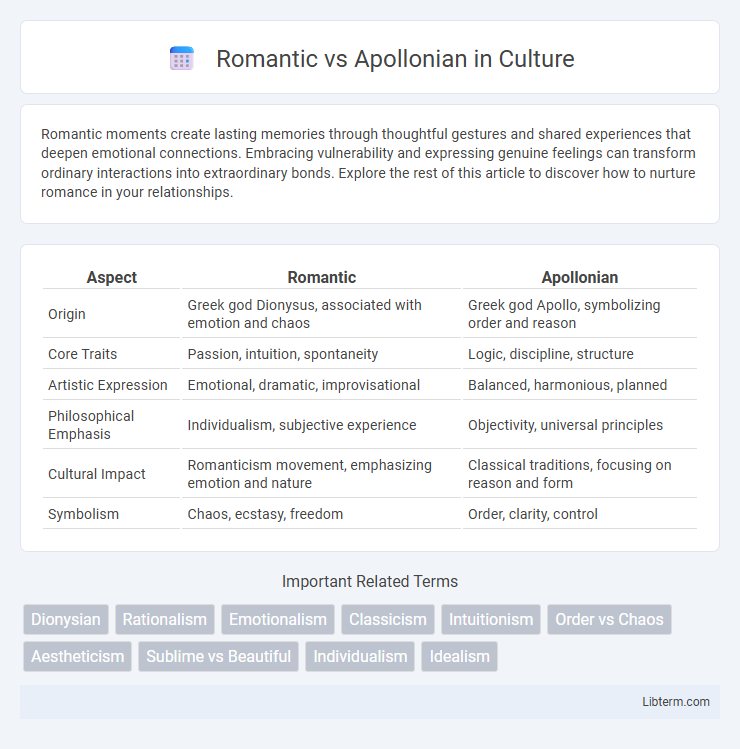Romantic moments create lasting memories through thoughtful gestures and shared experiences that deepen emotional connections. Embracing vulnerability and expressing genuine feelings can transform ordinary interactions into extraordinary bonds. Explore the rest of this article to discover how to nurture romance in your relationships.
Table of Comparison
| Aspect | Romantic | Apollonian |
|---|---|---|
| Origin | Greek god Dionysus, associated with emotion and chaos | Greek god Apollo, symbolizing order and reason |
| Core Traits | Passion, intuition, spontaneity | Logic, discipline, structure |
| Artistic Expression | Emotional, dramatic, improvisational | Balanced, harmonious, planned |
| Philosophical Emphasis | Individualism, subjective experience | Objectivity, universal principles |
| Cultural Impact | Romanticism movement, emphasizing emotion and nature | Classical traditions, focusing on reason and form |
| Symbolism | Chaos, ecstasy, freedom | Order, clarity, control |
Defining Romanticism and Apollonian Ideals
Romanticism emphasizes intense emotion, individual imagination, and the sublime experience of nature, celebrating creativity and spontaneity as core human values. Apollonian ideals prioritize order, reason, harmony, and restraint, drawing inspiration from the classical Greek god Apollo to represent rationality and structured beauty. These contrasting paradigms highlight the tension between unbridled emotional expression and disciplined intellectual control in art and culture.
Historical Origins and Key Influences
The Romantic vs Apollonian dichotomy originates from ancient Greek philosophy, particularly the ideas of Plato, who contrasted the chaotic, emotional forces embodied by Dionysus with the rational, orderly qualities represented by Apollo. This concept was later popularized by philosopher Friedrich Nietzsche in his work "The Birth of Tragedy," emphasizing the tension between passion and reason that shapes art and culture. Key influences include the Romantic Movement's focus on emotion and individualism versus classical ideals of harmony, balance, and logic rooted in Apollonian thought.
Core Philosophies: Emotion vs Reason
The Romantic philosophy emphasizes emotion, passion, and individual intuition as essential truths guiding human experience, celebrating creativity and subjective perception. In contrast, the Apollonian philosophy prioritizes reason, order, and logic, advocating for structure, clarity, and balance in thought and expression. Together, these core philosophies represent the tension between emotional depth and rational control in understanding reality.
Major Figures Representing Each Movement
Romanticism is epitomized by figures such as William Wordsworth and Caspar David Friedrich, whose works emphasize emotion, nature, and individualism. In contrast, the Apollonian ideal is embodied by thinkers like Immanuel Kant and artists like Jacques-Louis David, known for order, reason, and classical harmony. These representatives highlight the fundamental dichotomy between the imaginative, chaotic impulses of Romanticism and the structured, rational principles of the Apollonian tradition.
Impact on Art and Literature
The Romantic ethos emphasizes emotional intensity, individual imagination, and nature's sublime power, profoundly shaping 19th-century art and literature by inspiring works that celebrate passion, rebellion, and the existential depth of the human experience. In contrast, the Apollonian principle values order, logic, and harmony, influencing classical art and literary forms through structured compositions, clarity, and balanced beauty. The dynamic tension between Romantic chaos and Apollonian restraint continues to inform creative expression, driving innovation across genres and epochs.
Contrasting Approaches to Nature
Romanticism embraces nature as an emotional and spiritual force, emphasizing intuition, wild landscapes, and the sublime experience that connects humans with the infinite. The Apollonian approach values order, harmony, and reason, viewing nature through a lens of structure, balance, and controlled beauty inspired by classical ideals. These contrasting perspectives reveal Romanticism's celebration of untamed natural chaos versus Apollonian reverence for disciplined, harmonious form.
Concept of the Self: Individualism vs Universality
The Romantic concept of the self emphasizes individualism, valuing personal emotions, imagination, and subjective experience as central to identity. In contrast, the Apollonian self prioritizes universality, order, and rationality, seeking harmony through adherence to common principles and objective truths. This dichotomy reflects broader philosophical tensions between the celebration of unique inner life and the pursuit of collective, structured understanding.
Aesthetic Principles and Expression
Romantic aesthetics emphasize emotional intensity, individuality, and the sublime through passionate and often unpredictable artistic expression. Apollonian principles prioritize order, harmony, and balance, reflecting clarity, restraint, and structured form in creative works. Together, these contrasting approaches shape varied artistic narratives, balancing the chaotic impulses of the Romantic with the disciplined rationality of the Apollonian.
Legacy in Modern Culture
The legacy of Romantic and Apollonian ideals continues to shape modern culture by influencing art, literature, and philosophy through their embodiment of emotion versus reason. Romanticism's emphasis on individualism, creativity, and emotional depth persists in contemporary movements celebrating personal expression and the sublime. In contrast, Apollonian values of order, logic, and harmony underpin scientific inquiry, classical aesthetics, and structured narrative forms that dominate modern intellectual frameworks.
Choosing Between Romantic and Apollonian Perspectives Today
Choosing between Romantic and Apollonian perspectives today involves balancing emotional intuition with rational order. The Romantic approach emphasizes passion, creativity, and individualism, appealing to those valuing personal expression and emotional depth. In contrast, the Apollonian perspective prioritizes logic, structure, and harmony, offering clarity and stability in decision-making processes.
Romantic Infographic

 libterm.com
libterm.com